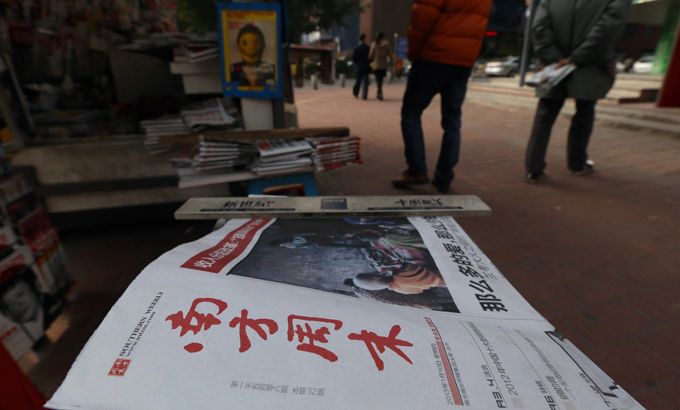
Testing China’s journalistic limits
How much freedom of the press is China’s new leadership willing to tolerate?
Last week we took a brief look at journalists protesting in China over some heavy-handed censorship by the Communist Party propaganda department. It was editors at the Southern Weekly – coming out of Guangdong province, a hotbed of journalistic chutzpah – who cried foul.
Their customary New Year message was deemed unfit to print and the regional apparatchik replaced it with their own version. What had begun as a call for constitutionality ended as a bland tribute to the party. A three-day strike by journalists ensued and tensions spilled out from the newsroom and into the streets. But there is more to the story than scuffles with security forces and the now familiar online showdown between micro-bloggers and cyber police.
This week, Listening Post gets to the heart of the story – a story that involves the Communist Party and its effort to redefine itself for a new decade under Xi Jinping. His talk of a ‘Chinese Dream’ envisages a new, more in-touch Communist Party that will stamp out corruption and usher in a new era of prosperity. But does that dream include a constitution that protects liberties and freedom for the press?
That was the question posed by the Southern Weekly and the outcome has been an uncomfortable compromise with the censors.
On this week’s show, we interpret the fallout with media voices: Josh Chin, the editor and lead writer for the WSJ China Real Time Report and Zhuang Chen, the Online Editor for the BBC Chinese service, as well as George Guo, a professor of Media at the University of London and Isabel Hilton, the editor of China Dialogue.
In this week’s Newsbytes: In Taiwan, protesters take to the streets to oppose what they call a Chinese takeover of the country’s media; another face-off between Globovision and the Chavez government; and in Greece, activists unhappy with the coverage of the economic crisis take their fight to the media.
Zero Dark Thirty
Our feature this week visits the crossroads where Hollywood meets Langley, Virginia – via Guantanamo Bay and the caves of Tora Bora. Coming from the director who won six Academy Awards for baring the American soul over Iraq with Hurt Locker, Kathryn Bigelow now takes on torture with Zero Dark Thirty. But did waterboarding really bring us the head of Osama bin Laden?
That is a question the movie answers in the affirmative, while even those who support waterboarding and other forms of physical abuse for intelligence purposes say that was not the case at all. Some might say that we do not go to the movies for historical accuracy. But, like it or not, the movies mould opinions and the silver-screen treatment of a subject as troublesome to the conscience as torture has the power to shape our sense of right and wrong on the matter.
Listening Post’s Nic Muirhead feature includes contributions from Peter Rainer, a film critic for Christian Science Monitor; Alissa Quart, the editor-at-large of The Atavist; Joshua Rothkopf, the senior film writer with Time Out in New York; and former CIA analyst, Glenn Carle.
Hollywood is also the subject of this week’s Online Video of the Week which takes apart the well worn cliches that keep millions of moviegoers glued to their seats. See if you can pick out all the movie references in this animated mashup by the French design collective, La Mécanique du Plastique. We hope you enjoy the show.
Listening Post can be seen each week at the following times GMT: Saturday: 0830, 1930; Sunday: 1430; Monday: 0430. Click here for more Listening Post. |
